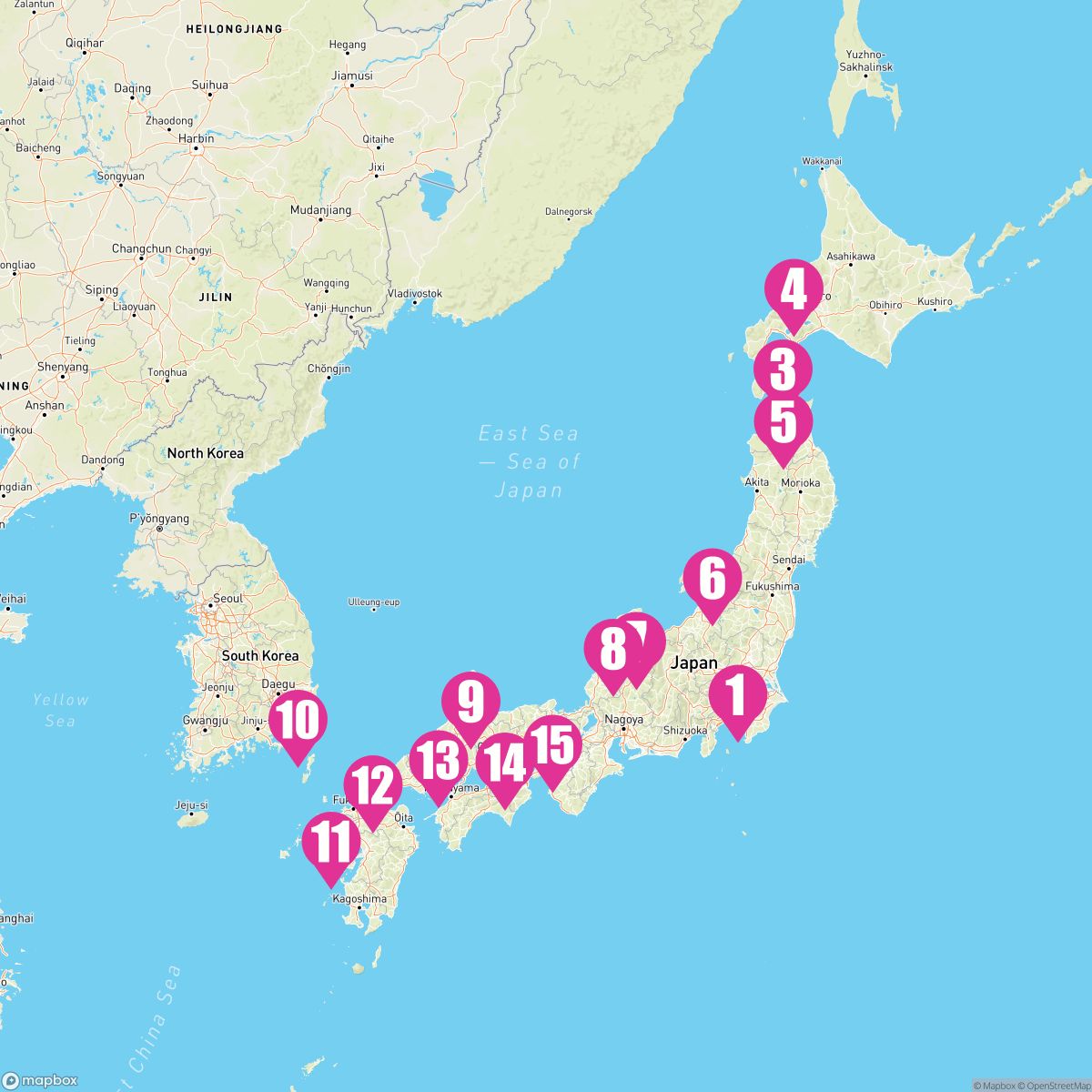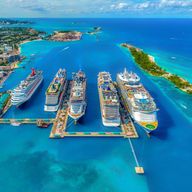

Azamara Pursuit - 5/3/2025
The May 3, 2025 cruise on the Azamara Pursuit departs from Tokyo, Japan. On this 15 Night Japan Intensive (Tokyo To Kobe) sailing, the ship will visit a total of 14 cruise port destinations, including its departure port. The Azamara Pursuit sets sail on Saturday, May 3rd and returns on Sunday, May 18th.
Cruise Pricing
The graph below tracks historic price of the Azamara Pursuit cruise ship departing May 3, 2025. The most recent price for this sailing starts at $4,129 ($276 per night) for an Inside Cabin. Compared to the average price of $5,221 ($349 per night), this represents a recent decrease of 21%.
Use the buttons below to toggle between cabin types.
Cruise Itinerary
Itinerary
Azamara Pursuit - May 3, 2025 - 15 Nights
| Day | Date | Port |
|---|---|---|
| 1 | May 3rd | Tokyo, Japan |
| 2 | May 4th | At Sea |
| 3 | May 5th | Hakodate, Japan |
| 4 | May 6th | Otaru (sapporo), Japan |
| 5 | May 7th | Aomori, Japan |
| 6 | May 8th | Niigata, Honshu, Japan |
| 7 | May 9th | Toyama, Japan |
| 8 | May 10th | Kanazawa, Japan |
| 9 | May 11th | Sakaiminato, Japan |
| 10 | May 12th | Busan (Pusan), South Korea |
| 11 | May 13th | Nagasaki, Japan |
| 12 | May 14th | Kitakyushu (moji, Mojiku), Japan |
| 13 | May 15th | Hiroshima, Japan |
| 14 | May 16th | Takamatsu, Japan |
| 15 | May 17th | Kobe (kyoto), Japan |
| 16 | May 3rd | Kobe (kyoto), Japan |
The Azamara Pursuit sails on May 3, 2025 for a 15 Night Japan Intensive (Tokyo To Kobe). The ship will depart the port of Tokyo, Japan at 7:00 PM and will return to the port of Kobe (kyoto), Japan on May 18th at N/A. During the 16-day journey, the Azamara Pursuit will visit 13 additional ports and will spend 1 days at sea.
Itinerary Safety Score
Based on my comprehensive research of cruise port safety information, including recent crime reports, travel advisories, Global Peace Index rankings, and specific port security concerns, we've created a "safety score" for each cruise port stop. The overall rating below represents a combined score for your specific cruise itinerary.
Cruise Ship

Azamara Pursuit
Azamara Cruise Line
The Azamara Pursuit was built in 2001 and is among Azamara's 3 ships in its fleet. The Azamara Pursuit is included in the cruise line's R class. In the cruise ship stats below, you'll find the Azamara Pursuit vs all other Azamara ships.
Cruise Ports
Tolanaro (Fort Dauphin), Madagascar, offers docking at Tolanaro Port. Travelers explore Nahampoana Reserve and Libanona Beach. Excursions include lemur-watching at Berenty Reserve. Local markets sell zebu curry. The peak season, May to October, brings dry weather for coastal tours. Photography captures rainforests and Indian Ocean vistas. Dining onboard includes romazava, a Malagasy favorite. Souvenirs, like raffia crafts, are sold in ship shops. Briefings cover Tsitongambarika history. Light clothing and sun protection suit the tropical climate, while sturdy shoes enhance reserve walks. Tolanaro’s natural allure offers a vibrant Malagasy stop. Cruise travelers enjoy a mix of unique wildlife and scenic beaches, making Tolanaro an engaging destination for exploration.
Take advantage of the many on board activites during your day at sea. You'll have more than enough to fill your day!
Hakodate, Japan, has docking at Hakodate Port. Travelers explore Goryokaku Fortress’ star-shaped design. Excursions visit Onuma Park’s scenic lakes. Local markets sell fresh squid. The peak season, April to June, brings mild weather. Photography captures night views from Mount Hakodate. Dining onboard includes kaisen don, a seafood bowl. Souvenirs, like glass crafts, are sold in ship shops. Briefings cover Hokkaido’s history. Light layers suit the temperate climate. Comfortable shoes enhance fortress tours. Hakodate’s historic charm and scenic beauty offer a serene Japanese stop, blending culture with natural splendor.
Otaru (Sapporo), Japan, offers docking at Otaru Port with excursions to Sapporo. Travelers explore Sapporo’s Odori Park and Snow Festival sites. Excursions visit Otaru’s historic canals. Local markets sell miso ramen. The peak season, June to August, brings mild weather for city tours. Photography captures urban parks and Hokkaido’s coastlines. Dining onboard includes jingisukan, a Hokkaido lamb dish. Souvenirs, like Sapporo beer glasses, are sold in ship shops. Briefings cover Hokkaido’s history. Light layers suit the temperate climate, while comfortable shoes enhance park walks. Otaru’s access to Sapporo offers a vibrant Japanese stop. Cruise travelers enjoy a mix of urban culture, historic canals, and Hokkaido’s culinary delights, making Otaru an engaging gateway to Japan’s northern island.
Aomori, Japan, docks at Aomori Port, 2 kilometers from downtown, with shuttles or taxis for 10-minute transfers. The city, population 280,000, features the Nebuta Museum, showcasing colorful floats from the August Nebuta Festival. Travelers visit Sannai-Maruyama, a 5-minute drive, for Jomon-era village reconstructions from 3900 BC. Hirosaki Castle, 45 minutes by train, offers cherry blossoms in April. Local markets sell apples and sake. Excursions to Lake Towada, 90 minutes south, include boat rides through volcanic scenery. Peak season April to October; taxis 800-1200 JPY. Dining features scallop miso soup at harbor cafes. Souvenirs include kokeshi dolls.
Niigata, Honshu, Japan, offers docking at Niigata Port. Travelers explore the Northern Culture Museum and Sado Island’s gold mines. Excursions visit Yahiko Shrine’s scenic trails. Local markets sell koshihikari rice. The peak season, April to October, brings mild weather for sightseeing. Photography captures traditional estates and Sea of Japan views. Dining onboard includes hegisoba, a Niigata noodle dish. Souvenirs, like sake bottles, are sold in ship shops. Briefings cover Niigata’s rice history. Light layers suit the temperate climate, while comfortable shoes enhance shrine walks. Niigata’s cultural and coastal charm offers a serene Japanese stop. Cruise travelers enjoy a mix of historic sites, scenic landscapes, and culinary traditions, making Niigata an engaging destination for exploring Japan’s Honshu heritage.
Toyama, Japan, offers docking at Toyama Port. Travelers explore Toyama Castle and Gokayama’s gassho-zukuri villages. Excursions visit Tateyama’s snow corridor. Local markets sell masuzushi. The peak season, April to October, brings mild weather for coastal tours. Photography captures historic villages and Japan Sea vistas. Dining onboard includes kaisendon, a Japanese favorite. Souvenirs, like lacquerware, are sold in ship shops. Briefings cover Hokuriku history. Light clothing and sun protection suit the temperate climate, while sturdy shoes enhance village walks. Toyama’s cultural charm offers a vibrant Japanese stop. Cruise travelers enjoy a mix of historic sites and scenic mountains, making Toyama an engaging destination for exploration.
Kanazawa, Japan, has docking at Kanazawa Port. Travelers explore Kenrokuen Garden’s serene landscapes. Excursions visit Higashi Chaya’s geisha district. Local markets sell kaga yuzen silk. The peak season, March to May, brings cherry blossoms. Photography captures gardens and traditional teahouses. Dining onboard includes kaga ryori, a local cuisine. Souvenirs, like gold leaf crafts, are sold in ship shops. Briefings cover samurai history. Light layers suit the temperate climate. Comfortable shoes enhance garden walks. Kanazawa’s cultural elegance offers a refined Japanese stop, blending heritage with scenic beauty.
Sakaiminato, Japan, offers docking at Sakaiminato Port. Travelers explore Mizuki Shigeru’s yokai museum and Tottori Sand Dunes. Excursions visit Matsue Castle. Local markets sell kani sushi. The peak season, April to October, brings mild weather for coastal tours. Photography captures manga art and Sea of Japan vistas. Dining onboard includes dashi broth, a Japanese favorite. Souvenirs, like yokai crafts, are sold in ship shops. Briefings cover Tottori history. Light layers suit the temperate climate, while comfortable shoes enhance dune walks. Sakaiminato’s quirky charm offers a vibrant Japanese stop. Cruise travelers enjoy a mix of cultural museums, scenic dunes, and coastal heritage, making Sakaiminato an engaging destination for exploration.
Busan, South Korea, in the southeast, sits on the Korea Strait, facing the Sea of Japan. The port is near Jagalchi Fish Market, where fresh seafood is sold daily. Haeundae Beach offers urban waterfront access, while Beomeosa Temple, in the forested hills, provides cultural history. The Gamcheon Culture Village, with colorful houses, draws visitors for its art and narrow alleys. Busan’s port history as a trading hub is evident in its maritime museum. The nearby Nakdong River Estuary is a birdwatching site, and the city’s coastal cliffs offer walking trails with ocean views.
Nagasaki, Japan, offers docking at Nagasaki Port. Travelers explore the Peace Park and Atomic Bomb Museum. Excursions visit Glover Garden’s colonial mansions. Local markets sell champon noodles. The peak season, March to May, brings cherry blossoms and mild weather. Photography captures historic sites and Dejima Island views. Dining onboard includes sara udon, a Nagasaki dish. Souvenirs, like castella cakes, are sold in ship shops. Briefings cover Nagasaki’s WWII history. Light layers suit the temperate climate, while comfortable shoes enhance park walks. Nagasaki’s blend of history and resilience offers a poignant Japanese stop. Cruise travelers enjoy a mix of somber memorials, colonial heritage, and scenic harbors, making Nagasaki an engaging destination for exploring Japan’s cultural and historical depth on Kyushu Island.
Kitakyushu, Japan, has docking at Moji Port. Travelers explore Kokura Castle and retro Mojiko district. Excursions visit Hiraodai’s limestone plateaus. Local markets sell yaki-udon. The peak season, March to May, brings mild weather. Photography captures samurai castles and port views. Dining onboard includes tonkotsu ramen, a local favorite. Souvenirs, like ceramic crafts, are sold in ship shops. Briefings cover Kyushu’s history. Light layers suit the temperate climate. Comfortable shoes enhance castle tours. Kitakyushu’s historic charm offers a serene Japanese stop, blending samurai heritage with coastal allure.
Hiroshima, Japan, has docking at Hiroshima Port. Travelers explore Peace Memorial Park and Atomic Bomb Dome. Excursions visit Miyajima’s floating Itsukushima Shrine. Local markets sell okonomiyaki. The peak season, March to May, brings cherry blossoms. Photography captures historic sites and island shrines. Dining onboard includes Hiroshima-style okonomiyaki. Souvenirs, like peace cranes, are sold in ship shops. Briefings cover WWII history. Light layers suit the temperate climate. Comfortable shoes enhance park walks. Hiroshima’s poignant history offers a profound Japanese stop, blending peace advocacy with cultural heritage.
Takamatsu, Japan, offers docking at Takamatsu Port. Travelers explore Ritsurin Garden and Yashima Temple. Excursions visit Naoshima’s art islands. Local markets sell sanuki udon. The peak season, April to October, brings mild weather for coastal tours. Photography captures bonsai gardens and Seto Inland Sea vistas. Dining onboard includes kagawa udon, a Japanese favorite. Souvenirs, like lacquerware, are sold in ship shops. Briefings cover Shikoku history. Light clothing and sun protection suit the temperate climate, while comfortable shoes enhance garden walks. Takamatsu’s cultural charm offers a vibrant Japanese stop. Cruise travelers enjoy a mix of scenic gardens and artistic islands, making Takamatsu an engaging destination for exploration.
Kobe, Japan, has docking at Kobe Port with excursions to Kyoto. Travelers explore Kyoto’s Kinkaku-ji Temple and Fushimi Inari Shrine. Excursions visit Arashiyama’s bamboo forest. Local markets sell matcha sweets. The peak season, March to May, brings cherry blossoms. Photography captures temples and gardens. Dining onboard includes kaiseki, a Japanese multi-course meal. Souvenirs, like sensu fans, are sold in ship shops. Briefings cover Kyoto’s history. Light layers suit the temperate climate. Comfortable shoes enhance temple tours. Kobe’s access to Kyoto offers a profound Japanese stop, blending heritage with cultural richness.
Kobe, Japan, has docking at Kobe Port with excursions to Kyoto. Travelers explore Kyoto’s Kinkaku-ji Temple and Fushimi Inari Shrine. Excursions visit Arashiyama’s bamboo forest. Local markets sell matcha sweets. The peak season, March to May, brings cherry blossoms. Photography captures temples and gardens. Dining onboard includes kaiseki, a Japanese multi-course meal. Souvenirs, like sensu fans, are sold in ship shops. Briefings cover Kyoto’s history. Light layers suit the temperate climate. Comfortable shoes enhance temple tours. Kobe’s access to Kyoto offers a profound Japanese stop, blending heritage with cultural richness.